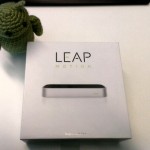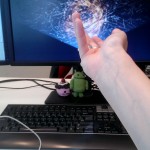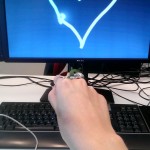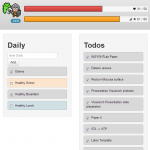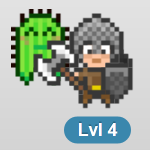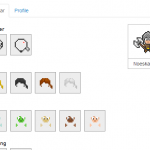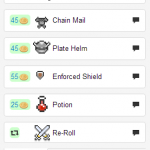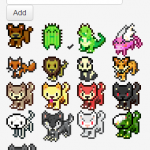Don’t look now, but I’m changing the theme!
Author: Noeska Smit
The Leap Motion: First Leap!
This is just a quick and dirty post about my first leaps with the Leap Motion. For those of you unfamiliar with this device, it’s a tiny device that provides ‘motion sensing technology for human–computer interaction’ and promises to be World’s Most Accurate 3-D Motion Control. Today I got to play around with a Leap Motion, because the lovely Computer Graphics and Visualization group is awesome that way.
First up: some low-quality phone pictures!
Comparison of Task Managers: Remember the Milk vs. Astrid vs. Wunderlist vs. Todoist
A blog post topic that has been ironically lingering on my To-do list for some time is a comparison of task managers I’ve been using over the years: Remember the Milk (RTM), Astrid, Wunderlist and Todoist. If there’s anything I love doing, it’s making To-do lists and if there’s another thing I really love it’s finding cool apps that help me get stuff done. I’m by no means a GTD-fan, but I do enjoy a good AutoFocus FV session (I’ll write a blog on that technique next) and lists in general. So let’s get started with the list comparison (lol). I’ll summarize my love, feelings of meh and other assorted ramblings for Remember the Milk, Astrid and Wunderlist and Todoist below.
My PhD supervisor left me
This post is of a more personal nature than most, but I would still like to write about this. Last September I took a course called ‘Achieving your goals and performing more successfully in your PhD‘ (a serious contender for the longest-course-name-ever-awards). Among other things, the course had us thinking of potential threats to getting our PhD-degree in the given time. The first thing that came to my mind was the thought of my supervisor leaving me. And guess what, that totally happened: my PhD supervisor left me!
What’s it like to be a PhD-student?
This weekend one of the students that is working on a MSc-thesis project related to my project asked me: ‘What’s it like to be a PhD-student?’. While there is no clear-cut answer for this and this probably varies wildly between fields, countries and departments, I would still like to reflect on my own experiences in this post. I am now officially one year into my PhD (out of four here in the Netherlands) and this is what it’s been like so far:
Preparing for a Scientific Meeting for PhD Students
The noble art of preparing for a scientific meeting is perhaps not the most exciting skill in your career, but fruitful meetings are definitely an important component of a successful PhD project. This week I flew to Leeds to visit the Virtual Pathology team with my medical project partners. So, an anatomist, a surgeon and a pathologist walk into a meeting room… This doesn’t sound like the start of a great joke, so I’ll stop myself right there. What I would like to discuss in this blog post however are some tips for having successful meetings. In your PhD there will be many meetings to be had, so you might as well make the most of them. Of course there are several types of meetings: the regular meetings with your supervisory team to discuss your progress and plans, meetings with your project partners to discuss project progress and then there are meetings with other scientists to discuss the possibilities for collaborations.
HabitRPG Review – Achievement Unlocked: Gamification Done Right!
I’ve been playing around with HabitRPG for a little over a month now, so as promised: my HabitRPG review! My initial impressions and description can be found in my previous post, but this post is a more in-depth review after a month of use. I backed the Kickstarter shortly after trying it out for a while and there have been a lot of updates since (not only due to my contribution, I’m sure 😉 ). The creator, Tyler Renelle, is obviously very passionate about HabitRPG and it really shows. Here’s my rundown of the things I love and the things I’m not too happy with. Let’s start with a short visual tour and after that I’ll get on with the review:
Scientific Presentation Pro Tips Part 2: The Presentation
A while ago I wrote the first part of a series of posts on scientific presentation tips to present your research in a memorable and interesting way. In part 1, I described the preparation process, now it’s time for the actual presentation giving: what to do, what to wear and other convenient tips.
Inbox Zero Redux: reduce e-mail overload like a boss
I thought it would be nice to discuss one of the ‘golden oldies’ of e-mail overload countering here: Inbox Zero and my modifications to Inbox Zero Redux. It’s been a while since this approach was introduced by Merlin Mann (an e-mail wizard name if I’ve ever heard one), 7 years already, but I still try to get my inbox to zero e-mails daily. And actually succeed most of the times. It might be a different story if suddenly start receiving hundreds of e-mails every day, but for now, this is working well for me.
Scientific Presentation Pro Tips Part 1: The Preparation
In this post I’d like to give you some scientific presentation tips to present your research well. Over the years as a student and now PhD candidate I’ve given many a presentation and had many a course on giving good presentations. In my first couple of presentations I was a complete nervous wreck and could barely breathe, later on this ‘evolved’ into smiling during the entire presentation combined with (bad) improvisational jokes and now I can even state I actually look forward to preparing and giving presentations. I’d have to say the course I’ve learnt the most from was definitely ‘The Art of Presenting Science’ by the awesome Gijs Meeusen and his team, so some of the tips I’m writing about, I picked up there. I cannot recommend this course enough, so do try and take it somewhere if you’re able to. If you’re not, I believe Veronika will do a nice write up about this course at some point (edit: She did and it’s glorious! Check it out here!) . This post will describe phase one in the presentation giving process: the preparation. Whether you’re presenting for your research group, at a conference or elsewhere, always be prepared 🙂
